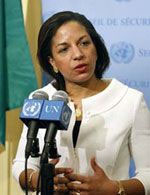U.N. votes to restore ‘sexual orientation’ to resolution against killings
In an important win for LGBT people and U.S. international diplomacy, the General Assembly of the United Nations voted to restore a reference to “sexual orientation” in a resolution against the killing of vulnerable minority groups—a reference that had been removed only a month earlier.
The vote to restore explicit mention of sexual orientation came on December 21, with 93 member nations favoring restoration, 55 countries voting against, 27 nations abstaining, and 17 countries absent. The United States sponsored the measure.
On the same day, the General Assembly then approved the amended resolution, with 122 countries voting in favor, no nation voting against, and 59 abstentions, according to the Associated Press.
LGBT civil rights groups and human rights activists welcomed the vote, praising U.S. Ambassador to the U.N. Susan Rice for her forceful advocacy.
On December 10, International Human Rights Day, Ambassador Rice said, in a U.N. speech, that she was “incensed” over the earlier vote to remove sexual orientation from a human rights resolution on extrajudicial, summary, and arbitrary executions. She vowed a U.S.-led push for its reinsertion.
“[We] applaud the principled leadership of the United States and other like-minded countries in restoring the language and staking out a clear claim for gay men and lesbians at the United Nations,” said Mark Bromley, chair of the Washington, D.C.-based Council for Global Equality, in a press release. The council advocates for American foreign policy inclusive of sexual orientation and gender identity, according to its mission statement.
“Protecting minorities from persecution is one of the United Nations’ most important functions,” said Todd Fernandez, a human rights lawyer and activist based in New York City. “U.N. leadership against anti-LGBT discrimination is now setting the tone for the world.”
Fernandez said that various international human rights treaties were written to include race, religion, and sex explicitly, but relegated sexual orientation to be implied under “other status.”
“Gradually, we are filling in this archaic gap in global consciousness and the Obama administration deserves credit for this,” said Fernandez.
Since 1999, the U.N. General Assembly has approved a bi-annual resolution on extrajudicial executions, urging nation states “to investigate promptly and thoroughly all killings,” including those “committed for any discriminatory reason,” including “sexual orientation.” The resolution is the only U.N. resolution explicitly mentioning “sexual orientation.” Although General Assembly resolutions are not legally binding, they do establish an international standard for a majority of the world’s nations.
In 2005, two teenage boys believed to be gay were hanged by Iran. Under Iran’s Islamic Penal Code of 1991, homosexual relationships are illegal, and sodomy is a crime punishable by death, according to the International Gay and Lesbian Association. The hangings were reported by BBC and Human Rights Watch.
As of May 2010, six other countries have laws allowing the execution of persons convicted of homosexual conduct, including Mauritania, Saudi Arabia, Yemen, Sudan, Somalia, and Nigeria, according to recently released publication of Human Rights Watch. And last fall, in Uganda, where a bill to broaden the criminalization homosexuality with death penalty provisions was introduced in Parliament, a newspaper published a list of prominent gay professionals, including names and addresses, with a call to “Hang Them.”
Back in November, when a U.N. committee voted on the extrajudicial resolution, a majority of nations voted to delete the reference to sexual orientation, yielding to pressure from some Arab and African member states to remove it. The vote was 79 to 70, with 17 countries abstaining and 26 nations not voting.
Removing that reference “felt like a stab in the back of homosexual people in countries where those killings do take place,” said Boris O. Dittrich, acting director of the Lesbian, Gay, Bisexual and Transgender Program of the Human Rights Watch, based in New York City.
Reinserting sexual orientation, he said, “could help put an end to the hateful killing of people based on their sexual orientation or gender identity.”
Following the U.N. reversal vote last week, the White House issued a statement applauding the outcome:
“Today’s vote in the United Nations marks an important moment in the struggle for civil and human rights. The time has come for all nations to redouble our efforts to end discrimination and violence against lesbian, gay, bisexual and transgender people.”
“No one should be killed for who they are,” said Secretary of State Hillary Clinton in a press release. “Sadly, many people around the world continue to be targeted and killed because of their sexual orientation. These heinous crimes must be condemned and investigated wherever they occur.”
Former U.S. Ambassador to Romania Michael Guest, now a senior adviser to the Global Equality Council, called the U.S. diplomatic effort “remarkable,” adding in a statement, “The United States took a very principled position, and our diplomats worked very hard at the U.N. and in capitals around the world to explain to other countries why this is an important human rights cause.”



Cool!
Maybe someday we’ll discourage the murder of gender queer, trans, intersex, gender variant people. That would be nice.